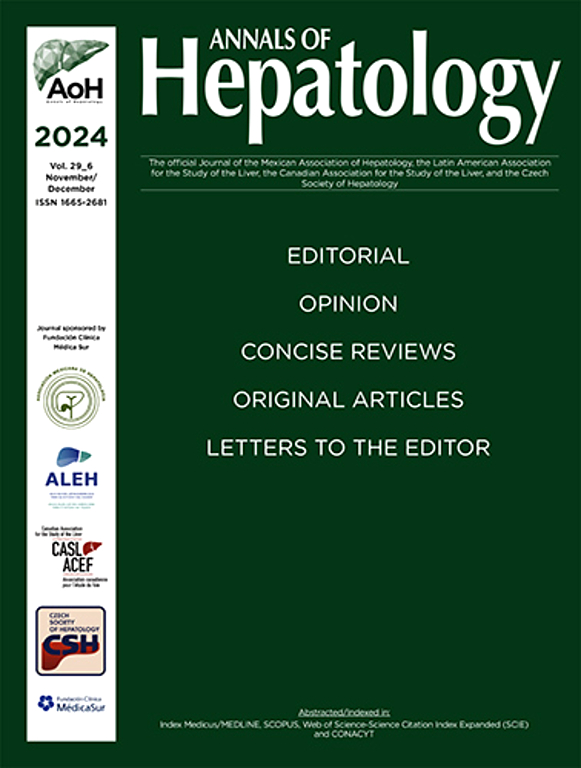PNPLA3 and SAMM50 variants are associated with lean nonalcoholic fatty liver disease in Asian population
IF 3.7
3区 医学
Q2 GASTROENTEROLOGY & HEPATOLOGY
引用次数: 0
Abstract
Introduction and Objectives
Lean adults with nonalcoholic fatty liver disease (NAFLD) have a higher risk of metabolic syndrome than lean controls. The study aimed to investigate the clinical and genetic features of lean NAFLD which remain unclear in Asian populations.
Materials and Methods
This was a genetic cohort study conducted in the HAVO Health Exam Clinic in 2020–2021 in Taiwan. Adults with a body mass index less than 24 kg/m2 were enrolled. Fatty liver was defined by ultrasonography. The candidate gene approach was based on the library of the NHGRI-EBI website. After removing duplication and nonsignificant variants, rs738409 in the PNPLA3 gene and rs3761472 in the SAMM50 gene were chosen. Multiple logistic regression models and receiver operating characteristic (ROC) curves were used.
Results
A total of 1652 lean controls and 602 lean NAFLD patients were enrolled. The average age was 43.8 ± 11.5 years. Lean NAFLD subjects were older and had a higher percentage of metabolic syndrome (case vs. control: 10.5 % vs. 1.5 %). The GG genotypes of PNPLA3 rs12483959 (OR: 3.06; 95% CI: 2.15–4.37) and SAMM50 rs3761472 (OR: 2.90; 95% CI: 2.04–4.14) had a higher risk of fatty liver after adjusting for BMI and metabolic syndrome. The areas under the ROC curve for PNPLA3 rs738409 and SAMM50 rs3761472 in the detection of lean NAFLD were 0.859 (95%CI: 0.841, 0.877) and 0.860 (95%CI: 0.843, 0.877), respectively.
Conclusions
PNPLA3 rs738409 and SAMM50 rs3761472 gene polymorphisms are associated with a higher risk of fatty liver in lean individuals independent of BMI and metabolic syndrome in Asian populations.

PNPLA3和SAMM50变异与亚洲人群的瘦型非酒精性脂肪肝有关。
简介和目的:患有非酒精性脂肪性肝病(NAFLD)的瘦成人比瘦对照组有更高的代谢综合征风险。该研究旨在调查瘦型NAFLD在亚洲人群中尚不清楚的临床和遗传特征。材料与方法:这是一项遗传队列研究,于2020-2021年在台湾HAVO健康检查诊所进行。研究对象为体重指数小于24 kg/m2的成年人。超声诊断脂肪肝。候选基因方法基于NHGRI-EBI网站的文库。在去除重复和不显著变异后,我们选择了PNPLA3基因中的rs738409和SAMM50基因中的rs3761472。采用多元logistic回归模型和受试者工作特征(ROC)曲线。结果:共纳入1652名瘦对照组和602名瘦NAFLD患者。平均年龄43.8±11.5岁。瘦型NAFLD受试者年龄较大,代谢综合征比例较高(病例与对照组:10.5%对1.5%)。PNPLA3 rs12483959的GG基因型(OR: 3.06;95% CI: 2.15-4.37)和SAMM50 rs3761472 (OR: 2.90;95% CI: 2.04-4.14)在调整BMI和代谢综合征后患脂肪肝的风险更高。PNPLA3 rs738409和SAMM50 rs3761472检测瘦肉NAFLD的ROC曲线下面积分别为0.859 (95%CI: 0.841, 0.877)和0.860 (95%CI: 0.843, 0.877)。结论:PNPLA3 rs738409和SAMM50 rs3761472基因多态性与亚洲人群中独立于BMI和代谢综合征的瘦人患脂肪肝的高风险相关。
本文章由计算机程序翻译,如有差异,请以英文原文为准。
求助全文
约1分钟内获得全文
求助全文
来源期刊

Annals of hepatology
医学-胃肠肝病学
CiteScore
7.90
自引率
2.60%
发文量
183
审稿时长
4-8 weeks
期刊介绍:
Annals of Hepatology publishes original research on the biology and diseases of the liver in both humans and experimental models. Contributions may be submitted as regular articles. The journal also publishes concise reviews of both basic and clinical topics.
 求助内容:
求助内容: 应助结果提醒方式:
应助结果提醒方式:


